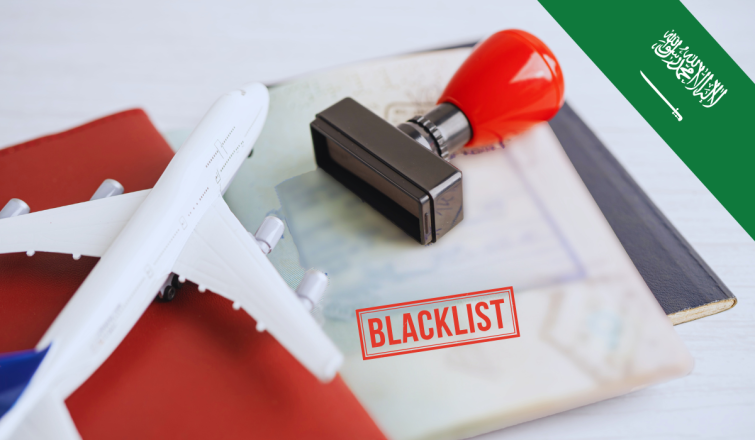Saudi Arabia's blacklisting can create significant hurdles for individuals. The impact is profound, affecting visa applications, work opportunities, and even travel plans. Consider that one misstep in compliance can lead to restrictions that make it nearly impossible to enter the country.
Understanding the types of blacklists in Saudi Arabia is important. There are mainly two categories: immigration blacklist and security blacklist. Each serves different purposes but can lead to serious consequences. This article will guide you step-by-step on how to verify your blacklisting status.
Understanding Saudi Arabia's Blacklist System
Saudi Arabia’s blacklist system is used to track individuals or companies that have violated legal, financial, or regulatory standards. Those on the blacklist face restrictions, such as being unable to enter the country, obtain certain permits, or conduct business activities. The system helps ensure compliance with laws and regulations, preventing illegal activities and protecting public and economic interests in the country.
Types of Blacklists: A Detailed Breakdown
The immigration blacklist primarily targets individuals with visa violations. This includes overstaying, working illegally, or failing to adhere to residency requirements. Consequences may include deportation and restrictions on future entry.
The security blacklist, on the other hand, comprises those involved in criminal activities or deemed a threat to national security. Being on this list often means arrest and detention.
Additional blacklists can exist, especially related to employment issues. These might include individuals who failed to uphold their job contracts or left without notice.
Legal Ramifications of Blacklisting: What it Means
Being blacklisted under Saudi law comes with severe penalties. For instance, those on an immigration blacklist may not be able to enter the country at all. The legal framework, including Saudi Arabian regulations, sets strict guidelines. Violating these laws can lead to deportation too.
Data Privacy and Your Rights: Knowing Your Options
Saudi Arabia has data protection laws that can help individuals. If you believe your information is wrongfully recorded, you have rights under these laws. Taking steps to contest this data can be a valuable course of action.
How to Check Your Status: A Step-by-Step Guide:
To check your status in Saudi Arabia, visit the official Absher platform or the Ministry of Interior's website. You’ll need to log in using your Iqama number or national ID. Once logged in, navigate to the relevant section to check your status, such as visa details, fines, or blacklist status. The platform provides an easy, digital way to stay updated on your records.
Checking Through Official Government Channels
To check your blacklisting status, visit official Saudi government websites. The Ministry of Interior's website is a key resource. Here’s how to navigate it:
Go to Ministry of Interior Website.
Find the section on "Visa and Immigration."
Enter your relevant personal details.
Submit your information to receive your status.
Make sure you have any required documentation ready, including your passport number and any previous visa details.
Contacting the Saudi Embassy or Consulate
If online checks are not an option, reaching out to a Saudi embassy or consulate is your next best bet. Here’s how you can do this:
Locate the nearest Saudi embassy or consulate.
Call or email them with your inquiries.
Provide your personal details such as name, nationality, and any pertinent ID.
For effective communication, prepare your questions in advance.
Seeking Assistance from Immigration Lawyers
Hiring an immigration lawyer can simplify the process. They understand Saudi Arabian immigration law and can help you navigate any complexities. Ensure you choose someone reputable and specialized in this field.
Common Reasons for Blacklisting:
Common reasons for blacklisting in Saudi Arabia include violations of immigration laws, such as overstaying visas, working without proper permits, or engaging in illegal activities. Non-payment of debts, financial fraud, and criminal offenses also contribute to blacklisting. Additionally, companies or individuals involved in serious legal violations, such as tax evasion or business misconduct, may be blacklisted, resulting in travel and business restrictions.
Visa Violations and Immigration Offenses
- Common visa violations leading to blacklisting include:
- Overstaying a visa.
- Working without authorization.
- Changing residency status without approval.
- Real-world cases highlight that even minor infractions can lead to significant consequences.
Security Concerns and Criminal Activities
Involvement in criminal acts can quickly lead to blacklisting. Examples include drug offenses or financial crimes. Saudi Arabia has zero tolerance for activities that threaten its security.
Financial and Employment Related Issues
Unpaid debts or breaches of employment contracts can also result in blacklisting. Addressing these issues can sometimes lead to removal from the list.
Appealing a Blacklist Decision:
To appeal a blacklist decision in Saudi Arabia, individuals or companies must submit a formal request to the relevant authorities, such as the Ministry of Interior or the General Directorate of Passports. The appeal process typically requires providing evidence to support the claim, such as proof of compliance or resolution of the violation. Legal assistance may be necessary to navigate the process effectively and resolve the issue.
Understanding the Appeals Process
If you find yourself blacklisted, it's crucial to understand how to appeal. Start by gathering necessary documents, such as:
Identification.
Proof of compliance or payment related to your offense.
You will submit your appeal to the relevant governmental body.
Gathering Evidence to Support Your Appeal
Your appeal will benefit from strong evidence. This could be:
Payment receipts.
Employment contracts.
Letters of recommendation.
Organizing this documentation will strengthen your case.
Seeking Legal Representation for Appeals
Navigating the appeals process can be complex. Professional legal representation can be invaluable. Look for lawyers with expertise in Saudi immigration law to guide you.
Conclusion: Protecting Yourself from Blacklisting
Understanding blacklisting in Saudi Arabia is vital for anyone traveling or working there. Adhere to local laws to avoid falling into this situation. Making informed decisions can help protect your status.
For assistance, consider contacting relevant authorities or legal advisors. Stay vigilant and informed about your rights and the regulations in Saudi Arabia. Taking the right steps can make all the difference in ensuring your ability to reside and travel without restrictions.
FAQs: How to Check If You Are Blacklisted in Saudi Arabia
1. How can I check if I am blacklisted in Saudi Arabia?
You can check your blacklist status through the official Absher platform or the Ministry of Interior’s website. Log in with your Iqama or national ID number to access relevant information.
2. What details do I need to check if I’m blacklisted?
You will need your Iqama number or passport details to check your blacklist status. Ensure that you have access to the Absher portal or the Ministry of Interior's website.
3. Can I check my blacklist status without an Iqama?
If you don’t have an Iqama, you may be able to use your passport details to check your status. However, Iqama is the most commonly used method for residents.
4. How do I know if I am blacklisted for a visa violation?
The Absher platform will show if there are any violations or restrictions associated with your visa status, including being blacklisted. If there are issues, you will likely see a related notice.
5. Can I check my blacklist status from outside Saudi Arabia?
Yes, you can check your blacklist status online via Absher or the Ministry of Interior website from anywhere, as long as you have access to the required login details.
6. What should I do if I am blacklisted?
If you find yourself blacklisted, you may need to resolve the underlying issue, such as paying fines, settling debts, or complying with immigration rules. You can also appeal the decision, depending on the circumstances.
7. How long does it take to check if I am blacklisted?
The process is quick and can be done in minutes through the Absher platform or the Ministry of Interior’s website, as long as you have the correct login information.
8. Are there any fees to check my blacklist status?
No, there are no fees associated with checking your blacklist status through the Absher platform or the Ministry of Interior's website.







